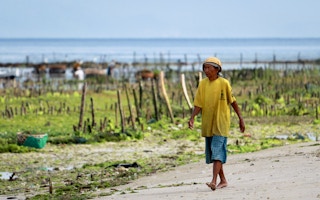Imagine a catastrophic event that blocked out the sun, such as the eruption of a large volcano, or even a nuclear war.
An international team of researchers say resilient food sources are needed to save humanity from starvation in the case of such an event – and that seaweed could be the solution.
Seaweed is rich in nutrients and provides livelihoods for coastal communities in many lower-income countries.
“Investing in the construction of seaweed farms could prevent global famine in abrupt sunlight reduction scenarios, potentially averting a significant number of deaths from starvation,” said David Denkenberger, associate professor of mechanical engineering at the University of Canterbury, in the UK.
The research published in the journal Earth’s Future found that seaweed is a versatile commodity, which can serve as a critical food and fuel source when everything else becomes scarce following widespread catastrophe.
It is resilient enough to survive and thrive in tropical oceans even after a full-blown nuclear war, according to the researchers from the Alliance to Feed the Earth in Disasters, Louisiana State University, USA, University of the Philippines Marine Science Institute (UP-MSI), and the University of Canterbury.
The researchers constructed a model based on the seaweed Gracilaria tikvahiae, commonly known as graceful redweed. Using available nuclear winter climate data, they simulated the seaweed’s growth after an adverse global event.
Nuclear winter
According to the authors, if nuclear war broke out and thousands of warheads were exchanged between nuclear powers, an estimated 150 Teragram (Tg) of soot emissions could be ejected into the atmosphere, blocking the sunlight for years.
But they found that there would still be enough sunlight for seaweeds to photosynthesise and grow, even with black carbon in the atmosphere.
“
Investing in the construction of seaweed farms could prevent global famine in abrupt sunlight reduction scenarios, potentially averting a significant number of deaths from starvation.
David Denkenberger, associate professor, University of Canterbury
Michael Roleda, professor at UP-MSI and co-author of the study, told SciDev.Net: “Some seaweed species’ light requirement to saturate photosynthesis could be as low as 50-100 µmol photons.”
He said that sunlight in the tropics during the noon time of a cloudless day can reach almost 2,000 µmol photons.
With optimal area for production and preparation, seaweed could meet the equivalent of 45 per cent of global food demand after only nine months of intensified production, according to the study.
However, the researchers also noted that only up to 15 per cent of the human diet could be provided by seaweed due to its high iodine content.
Aside from an all-out nuclear war scenario, they said seaweed could be a viable addition to global food security now, as well as in smaller nuclear exchanges and volcanic eruptions.
Nutritional value
Seaweeds, often eaten in salads or as dried food wraps, are rich in proteins, minerals, vitamins, essential amino acids and fatty acids.
Asked if seaweeds would be fit for human consumption after a nuclear war, Roleda said they would naturally absorb contaminants from the environment, but the toxic substances bound and concentrated in the seaweeds could be reduced to safe levels.
“For example, post-harvest processing and pre-consumption preparation, like washing and drying, enzymatic reaction, and blanching or cooking, among others, have been found to significantly reduce iodine and heavy metals concentration in seaweeds,” he said.
Seaweed production is a lifeline for many families living in poor, coastal communities in lower-income countries.
The organism is largely protected underwater and can grow faster than any other known agricultural crop.
According to a Food and Agriculture Organization report in 2021, cultivated seaweed production in Asia contributed 97 per cent of the 34.7 million tonnes produced globally. As well as being consumed as food, it is used for animal food additives and cosmetics.
China currently produces more than 50 per cent of the world’s supply, followed by Indonesia. Other notable producers are South Korea and the Philippines.
Another recent study, however, offers a different perspective on the impact of a nuclear war and the dire consequences for all life globally, including the decimation of marine life.
The authors simulated the climate impacts of US-Russia and India-Pakistan nuclear wars and said the result would be global cooling, with sea ice expanding into coastal communities.
The ocean recovery, according to that study, would be very slow — decades at the surface and hundreds of years at depth, with thousands of years in cooler waters such as the Arctic. It said marine ecosystems would not only be deeply disrupted by the initial impact of a nuclear war, but would further deteriorate with the new ocean state, impacting the global ecosystem.
Ravi Rebbapragada, chair of Mines, Minerals & PEOPLE, an emerging alliance of environmental advocates in India, stressed that a nuclear war should be avoided at all costs, regardless of either findings.
“On a fundamental point, a nuclear war is not only dangerous but it will have a long-lasting effect on the global climate to a point of no return,” he said.
This article was originally published on SciDev.Net. Read the original article.

















